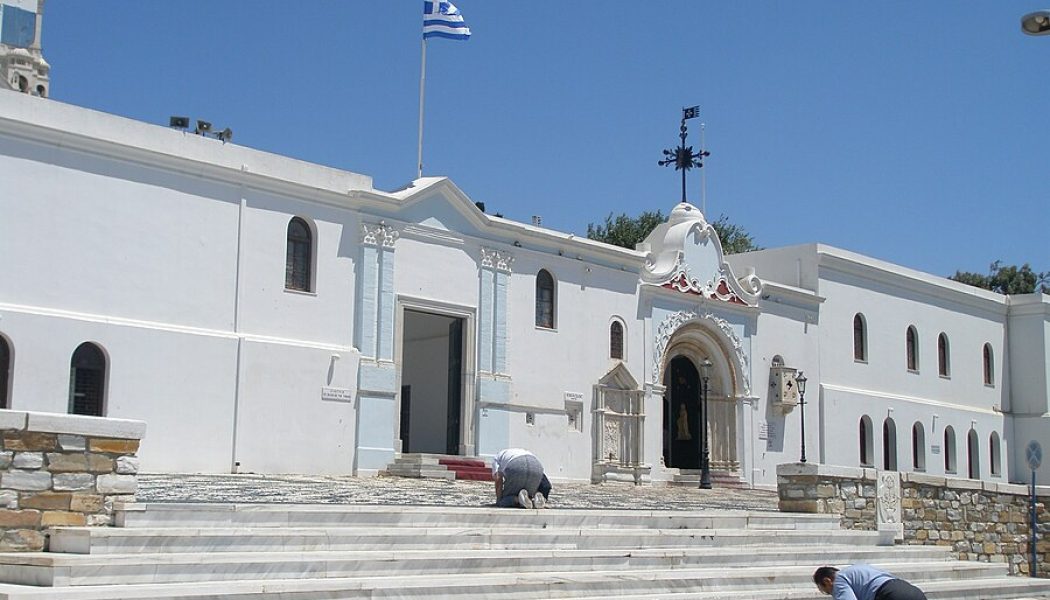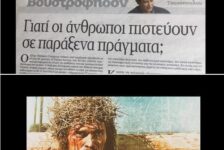“As for miracles, I will confess to you that I have not seen any miracle here, one of a blind man seeing, a paralyzed man walking, a sick man being healed before my eyes. But I have seen thousands of souls, who come tired, disappointed, even to the point of leaving the present in a violent way. And then I have seen them to depart from this place light, smiling, internally rested, having decided that they must put a full stop and start a new life. Therefore, I have to tell you, from my 45 years of ministry in this archdiocese and on the holy platform of Evangelistria, thousands of internal miracles in the souls of people.“
The first part of this confession – “miracles do not happen” in short – from the lips of an atheist such as the undersigned, would have little, if any, stock value in the stock exchange of ideas: whatever opinion believers may have of atheists, whether they consider them incarnated harbingers of the Antichrist or ‘damaged’ from too much reading, they more or less agree that they maintain some contact with Reason and resist reconciling with the extravagant fairy tale (it is no coincidence that the fairy tale also refers to consolation) that miracles happen, let alone that they happen on demand, that is, by overturning the natural laws, of everything we learn in our schools, if and when we learn them, however poorly digested we assimilate them or however much intellectual effort we put into reconciling them with the exact opposite that we are also being taught, the myths in the Religious Studies course.
However, when the first part of the same confession comes from the lips of the expert in the topic, the archbishop of Syros, Tinos, Andros, Kea and Milos, Dorotheus II, in an interview this time of the year last year, its stock market value is skyrocketing. In addition to the other consequences, Dorotheus II indirectly draws our attention to a parameter that may be considered self-evident for us atheists, but which continues to be used systematically and seemingly correct by the cassock-clad: miracles (they claim) are an issue of faith· if you do not believe that you will experience a miracle, what kind of miracle do you expect to experience? No, my dears – the archbishop answers them cunningly – miracles produce ‘objective’ results too. The blind man who finds his light or the paralyzed man who walks, I, the archbishop, will see him, and also Tatsopoulos, the unbeliever, will see him. So if I, the archbishop of Tinos, in my 46 years of ministry, have not seen any blind man to see and no paralytic to walk, what kind of miracles have I seen?
Dorotheus II himself, in the second part of his confession, gives the answer: he may not have seen any ‘external’ miracles, but he has seen many ‘internal’ miracles, from the way they are apparently… externalized: countless ‘internal’ transformations, people who arrived at the port of Tinos with a dark predisposition, even with an irresistible urge to kill themselves, but as soon as they climbed the steps of Megalochari, standing or on their knees, they were overwhelmed by a brilliant ‘inner’ light and left the island determined to face henceforth courageously every adversity. OK, let us accept it. Accept that the Virgin of Tinos, like all placebo drugs of a religious or other nature, even plain sugar with a little water or your lucky rabbit’s foot, can drastically change your mood, especially if… you believe in advance that it will change your mood (this is how the self-fulfilling prophecy always and everywhere works). Let us also ignore the whining of all those directly affected – psychologists, psychiatrists, neurologists and other specialties – who will prefer to tear up their diplomas rather than admit that an icon that was located in 1823 following the instructions of the Virgin Mary “in person” to a nun (actually the Virgin Mary, even two centuries ago, she did not share other worldly concerns, such as our own revolution against the Ottomans, in full swing at the time, but only the locating of her own icons, the multiplication of her own monasteries, etc.), can cure you immediately, without delay, from deep depression.
However, if the amiable archbishop will allow me, that is exactly where the problem lies. The mythical revenues of the Virgin of Tinos during the two centuries that have passed after the nun’s lucrative ‘vision’, as well as their scandalous management (uninvestigated until now) which led in 2017 to a general but vain intervention by the judicial authorities, of the Economic Crime Prosecution Service and the National Intelligence Service, those revenues did not come up with the monstrous undocumented spermology for ‘internal’ miracles, but with the corresponding one for ‘external’ ones. No deacon of Megalochari stands in the harbor, when the ships unload the caravans of the desperate on the 15th of August, to whisper in their ear words of half-hearted comfort: “Listen, you’re not going to get out of your wheelchair, but you’re going to feel a lot better”. Somewhere here the miracle ends. Somewhere here the trauma begins.
(Published in “The TOC”, August 14, 2023)
Petros Tatsopoulos is a writer and former Member of the Greek Parliament.










